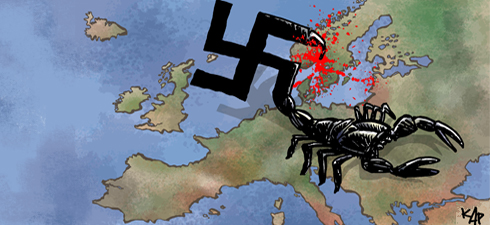Nordisk, an online forum for Nordic extremists, which Anders Breivik was once a member of, recently had some 22,000 members from all Nordic countries. Although of all Scandinavian extremists the Norwegians are least numerous (also in internet terms), Norwegian police warned in a February report of their ever more intense ties with their Swedish counterparts as well as with far-right movements in Russia (mainly St. Petersburg neo-Nazis).
The Nordic extremists have no common structure, but according to the Europol, international connections between extremist groups have been ever closer, with ties initiated on the internet developed further during music concerts of “white power” bands propagating the philosophy of white racial supremacy.
“What we are watching is 21st-century fundamentalism, rebelling against hateful modernity, defending an identity based on the Christian cross, Germanic blood ties, the cult of the Scandinavian god of war, Odin, and the heroic sagas of the Nibelungen”, says Ugo Maria Tassinari, an Italian expert on far-right extremism.
Far-right has less and less the face of a beefy tattooed skinhead
In Europe, the combination of racist xenophobia and religious themes is a Scandinavian specialty, that has already been export to Italy, among other places, where the Nordic movement has inspired the Militia Christi extremist movement.
According to recent estimates there were only some 2,000 far-right extremists in Norway. In pre-internet times, they’d have probably remained dispersed throughout the country without an easy way to meet and rev up their fanaticism during hard-to-organise rallies. These days, the Web allows even a “boy from a perfectly normal home” to live a seemingly normal life while at the same time participating in the workings of an ‘extremist international’ that is just a mouse-click away. To talk, share readings, exchange information on enemies of the nation, and fish for new supporters.
Also in Germany the modern-day extreme right has less and less the face of a beefy tattooed skinhead and more and more of a well-dressed nice guy from next door who shows his real self only when logged in to the web. The same phenomenon was at work during the last decade with Al-Qaeda and its supporters.
“Others” who spoil the healthy spirit of the nations
Today’s Norwegian extremism didn’t begin with community portals, though. As early as in the mid-1990s one Alfred Olsen, a person of questionable mental stability, organised “anti-Zionist conferences” and wanted to organise the People’s Resistance Movement – Christian Alternative to fight “Marxist capitalism”, “liberal Marxism” and “foreign agents” in the Norwegian government. The black-metal musician Varg Vikernes propagated hatred of the outside world using a language that was neo-pagan or even satanic – and did attract a group of supporters.
Vikernes was eventually jailed for setting churches on fire and murdering a fellow musician and, while in prison, wrote a manifesto called Vargsmål, or “Wolf’s Story”, a praise of Nordic loyalty, courage, wisdom, discipline, health and power. The text circulates on extremist internet forums to this day and has contributed to a peculiar symbolic mishmash: today, the cross, the swastika and Odin are all embraced by the supporters of the same far-right ideology.
Their enemies include the racial, national or religious “others” (Muslims, Jews) as well as those “others” who spoil the healthy spirit of the nations: bankers, international corporate executives, globalists, and governments that don’t understand the danger at hand or actually support the “others”. What the extremists want is a crusade and an anti-globalist revolution.
Translated from the Polish by Marcin Wawrzyńczak
Was this article useful? If so we are delighted!
It is freely available because we believe that the right to free and independent information is essential for democracy. But this right is not guaranteed forever, and independence comes at a cost. We need your support in order to continue publishing independent, multilingual news for all Europeans.
Discover our subscription offers and their exclusive benefits and become a member of our community now!












